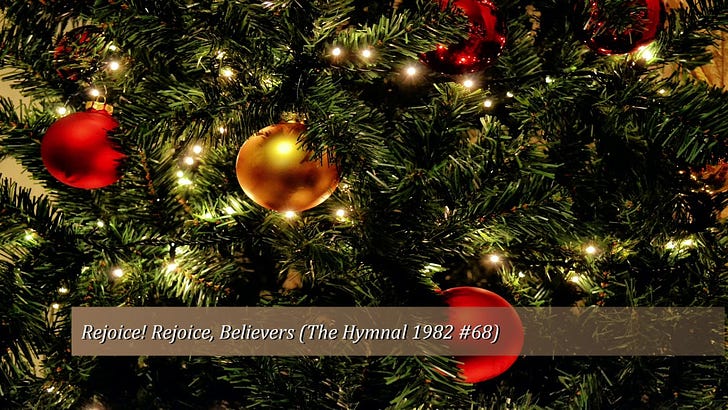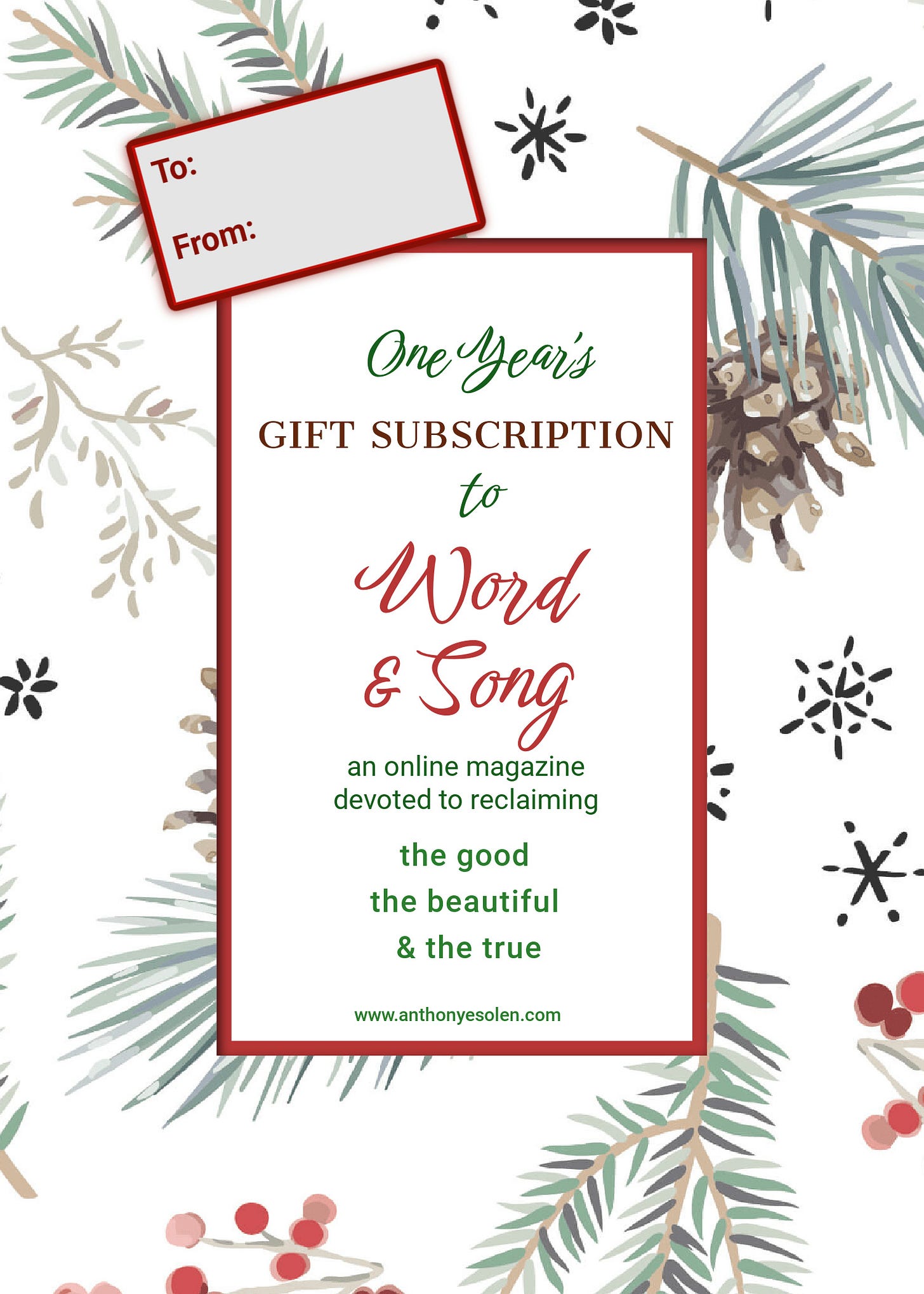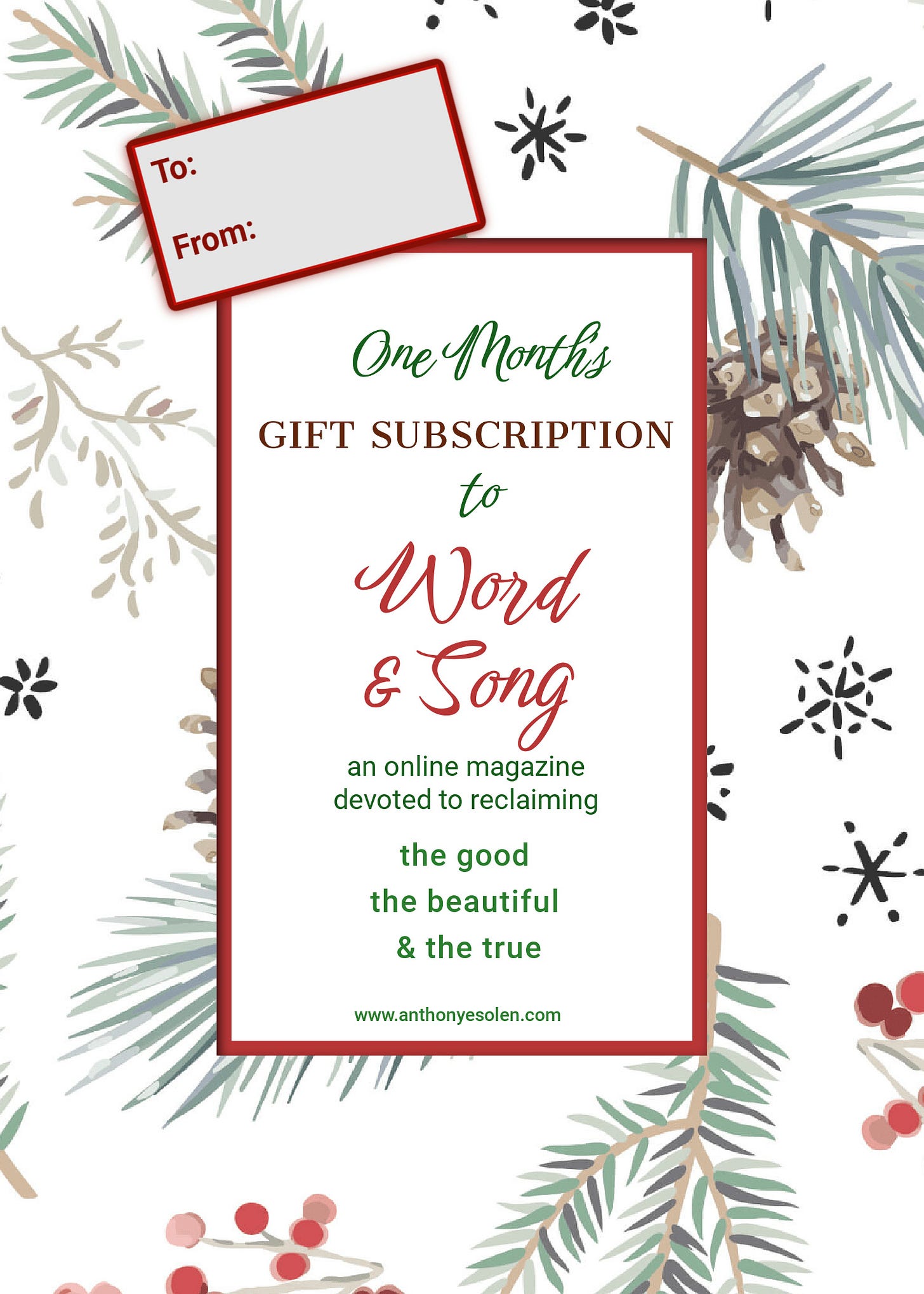Advent is here, and so are our Christmas offers at Word & Song!
Now through Epiphany new paid, gift, and upgraded subscriptions are 25% off.
Paid subscribers see a special gift offer at the very bottom of this page.
Our theme this first week of Advent is adventure, and so I’d like to make an observation that really should not be controversial. It’s that the world that Christians and Jews inhabit — I won’t prescribe here for other religions — is essentially adventurous, because the Author of that world is fully present and fully active and fully free in every least particle of matter, every tiniest extent of space, and every fleetest instant of time. Adventure is, I’ve suggested, a profoundly personal thing, the openness of the person to the action of another, whether it’s your neighbor or your kinsman or, in the ultimate sense, God Himself, acting by secondary means through the created world, or by primary means, directly, by grace. If your highest view of life is that you must wring the most pleasure out of it, or, what you have a better chance at doing, suffer the least pain from it, then you will soon find that adventures have eluded you. The ancient poet Lucretius thought (and preached) that the best thing in life was to enjoy a meal by the riverside in fair weather, talking with friends about philosophy. That was all he could see, because he hadn’t any hope or really any notion of a providential and all-loving God; he rejected the popular portrayals of the pagan gods, but he had nothing to put in their place.
But God, as is revealed in every passage of Scripture, acts. He says to Abraham, “Leave this native country of yours, and all your kin, and go far away to the land I will show you.” And Abraham does the right thing, the mad thing. He goes. He says to Samuel, “Go to the house of Jesse, and I will show you which son of his will become king.” And all the sons of Jesse present themselves, but God rejects them all, and Samuel actually has to ask whether there’s a son Jesse hasn’t shown him. It turns out that there is — the youngest, still a boy. His name is David. And what shall we say of the prophet Jeremiah, cast down into the filthy cistern for daring to prophesy that the king had better come to terms with Nebuchadnezzar? Or Jesus, who time and again brings those who hear him to a moment of dreadful decision. “And you, will you also go?” he asks his disciples, after what he has said about the Bread of Life has dismayed and perplexed so many, who leave him. “To whom shall we go?” says Peter. “You have the words of everlasting life.” Peter has cast himself upon the waters; and come what may, even when he is weakest, he will not turn back.
The urgency, the sheer adventure, comes across well in our Hymn of the Week, “Rejoice, Rejoice, Believers.” It’s actually a fine hymn-poem, written in German by Laurentius Laurenti, the cantor and director of music at Saint Peter’s Cathedral, in Bremen. (Yes, that’s the same Bremen to which the donkey, the dog, the cat, and the rooster were going, to become the Bremen Town Musicians, in that old folk tale.) Laurenti wrote it in eight stanzas, and I’ve seen a Gothic-script page out of a Lutheran hymnal where it is to be found. It’s all print, no music, and no division into poetic lines; people took for granted that you’d pick up the melody on your own. Laurenti’s text comes from Jesus’ parable of the five watchful and wise virgins, and the five foolish virgins. The former kept their lamps lit with oil and were on the watch; the latter did not, and so the coming of the Bridegroom took them completely off guard. We mustn’t think that those foolish ones were literally asleep. They might have been busying themselves with all kinds of things in this life of ours, but not with the one thing needful. So when they went to ask the five wise virgins for some of their oil, they were told that they couldn’t spare any, but that they should go try to procure some elsewhere. Alas, it was too late.
Well, you’re probably not going to get eight stanzas of eight lines each, from that parable alone. But that’s not what the old hymn writers did. They were immersed in Scripture, so that it came naturally to them to hear echoes of one passage in another, and why not? The same apostle John who heard the parable of the coming of the Bridegroom sees the vision of the marriage of the Lamb, in the heavenly Jerusalem. His own final words are filled also with both expectation and joy, urgency and peace, for “the Spirit and the Bride say, Come.” So Laurenti weaves the images of the parable with images from Revelation, and then he applies them all to his own personal life — that is, each one of us who sings the hymn is led to do so. The result is quite powerful. The urgency does come across — the adventure of faith, of a life wherein each moment possesses the character of a corner to be turned, a path to be taken, an eye to open and to behold the truth.
Laurenti, as I said, wrote eight stanzas; my favorite hymnal gives the four below, translated by Sarah Findlater (1854).
Here is our hymn, sung to the tune Llangloffan, by the choir of Grace & Holy Trinity Episcopal Church.
Rejoice, rejoice, believers! And let your lights appear; The evening is advancing, And darker night is near. The Bridegroom is arising, And soon he will draw nigh; Up, watch in expectation! At midnight comes the cry. See that your lamps are burning; Replenish them with oil; Look now for your salvation, The end of sin and toil. The watchers on the mountain Proclaim the Bridegroom near; Go meet him as he cometh, With alleluias clear. O wise and holy virgins, Now raise your voices higher, Until in songs of triumph Ye meet the angel choir. The marriage feast is waiting, The gates wide open stand; Rise up, ye heirs of glory! The Bridegroom is at hand. Our hope and expectation, O Jesus, now appear; Arise, thou Sun so longed for, O'er this benighted sphere! With hearts and hands uplifted, We plead, O Lord, to see The day of earth's redemption, And ever be with thee!
Paid subscribers: enjoy a special 50% off rate on gift subscriptions through January 7th by using the button below. You may schedule the date when you wish your gift subscription(s) to begin. You may also choose one-month gift subscriptions for $9.99. For your convenience, we’ve created printable gift certificates to send or present.
Thank you for supporting Word & Song.






How powerful that is.
We grew up with this melody to this great hymn: https://www.youtube.com/watch?v=qVLxM1KPCjs&list=RDqVLxM1KPCjs&start_radio=1&rv=qVLxM1KPCjs